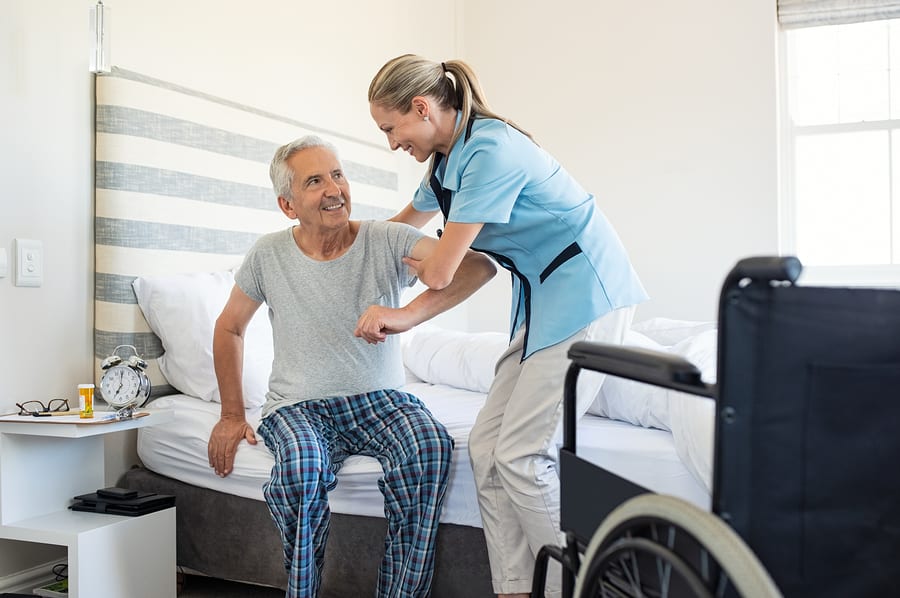Readmission to the hospital is a growing problem, especially as one ages. When your loved one is admitted to the hospital after a serious fall, a stroke, a heart attack, or other health issue, it can become even more likely that they will return to hospital. According to Medicare, roughly 20 percent of discharged patients in the U.S. health system return to the hospital within 30 days. It is important to help your loved one recuperate, to help reduce the chance of a return trip to the hospital.
Communication
Communication is key in helping your loved one stay on track for a healthy recovery. Communicating with your loved one and their healthcare providers can help you meet the needs for their recovery. It is important to ask questions regarding care needs, including ways that you can improve their recovery. Also, don’t be afraid to ask their healthcare provider about what you and your family can do to help; including ways to monitor their condition.
Technology to Reduce Readmission
Technology can be an important part of your loved one’s recovery process. Before leaving the hospital, talk to the staff about any technology available to the public that can help with recording or monitoring their recovery. Being able to easily check and track your loved one’s vitals, or being able to monitor their condition remotely can reduce risk factors of readmission. This can be especially helpful for cardiac rehabilitation.
Managing Medicine
A trip to the hospital may mean that your loved one is put on additional medications. Managing your loved one’s medications, and keeping a record can be important. Depending on their condition, it may be difficult for your loved one to manage their medications on their own. Records of medications and their times that they are taken is important if they do end up returning to the hospital.
Readmission Reduction and Follow-Up Appointments
Following up a hospital visit with appointments to specialists; or even your loved one’s general physician can be important. These appointments can help review their condition; including making a note of medication side effects that your loved one may be experiencing.
Nutrition
Proper diet and nutrition can be an important aspect of recovery, especially when on new medications. Many medications require being taken with meals. Other medications require the avoidance of certain foods rich in specific vitamins or minerals. A fridge stocked with fresh, healthy ingredients adhering to your loved one’s new dietary restrictions can help promote recovery, and reduce the risk of readmission.
Exercise and Physical Therapy
Work with your loved one’s healthcare providers to figure out any exercise or physical therapy available to them, depending on their condition. They may be able to provide recommended in-home exercises, or physical therapy centers. Overall, an exercise plan tailored to your loved one’s unique conditions and needs can help with recovery.
Professional Home Care to Reduce Readmission
Professional healthcare at home can be important in helping your loved one recover; especially if you are not in a position to provide the full-time care that your loved one may need. A home nurse or health aide can help your loved one take the steps needed for home recovery that reduces readmission risks. Safe Harbor Healthcare Services has been providing families with the peace of mind that their loved one is receiving proper care for over 50 years. Our Registered Nurses and Licenced Practical Nurses perform tasks for clients with on-going medical problems; and working closely with doctors to ensure that your loved one’s care needs are met. Our Certified Home Health Aides provide assistance with activities of daily living in many aspects, as well as accompaniment to doctors’ appointments. Aides provide personal care and designated health related services to maintain their patient’s physical and emotional well-being.
Safe Harbor Healthcare Services does not provide medical or healthcare advice via articles. This material has been prepared for informational purposes only, and is not intended to provide, and should not be relied on for medical advice.
Safe Harbor Healthcare Services has been providing excellent home care on Staten Island since 1967. Our services help the elderly and disabled live safely and independently; while giving their families the peace of mind they need. For more information, contact Safe Harbor by clicking here, or call us at (718)-979-6900.

